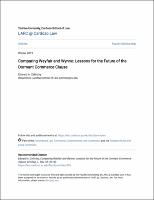Please use this identifier to cite or link to this item:
https://hdl.handle.net/20.500.12202/10111| Title: | Comparing Wayfair and Wynne: Lessons for the Future of the Dormant Commerce Clause |
| Authors: | Zelinsky, Edward A. |
| Keywords: | internet commerce dormant Commerce Clause electronic commerce sales tax Wayfair Wynne Quill substantial nexus stare decisis comvenience of the employer physical presence statutory residence |
| Issue Date: | 1-Jan-2019 |
| Publisher: | Chapman University, Fowler School of Law |
| Citation: | Edward A. Zelinsky, Comparing Wayfair and Wynne: Lessons for the Future of the Dormant Commerce Clause, 22 Chap. L. Rev. 55 (2019). https://larc.cardozo.yu.edu/faculty-articles/526 |
| Abstract: | •A comparison of South Dakota v. Wayfair with Comptroller of the Treasury of Maryland v. Wynne indicates that the prospect of the Supreme Court jettisoning the dormant Commerce Clause altogether is unlikely. However, the justices who would abandon the dormant Commerce Clause can exercise decisive influence in particular cases as they did in Wayfair. The current Court’s dormant Commerce Clause skeptics – Justices Thomas and Gorsuch –provided the crucial fourth and fifth votes in Wayfair to overturn Quill. •It will continue to be rare for the Court to reverse its own dormant Commerce Clause decisions. Far from opening the floodgates, Wayfair indicates that the Court is reluctant to overrule its dormant Commerce Clause cases in light of Congress’s ultimate constitutional power to regulate interstate commerce. However, when neither the Court nor Congress has spoken on a particular issue, the Court will consider extending the dormant Commerce Clause as it did in Wynne. •Going forward, an important issue under the dormant Commerce Clause will be the double taxation which results when an individual is deemed to be a resident for tax purposes by two states, each of which taxes all of the dual resident’s income. Wayfair and Wynne suggest that, despite the compelling arguments against the double state taxation of dual residents’ incomes, the Court will be reluctant to set aside its precedents upholding the double state taxation of dual residents. •The Court is more likely to extend dormant Commerce Clause protection when states are overly-aggressive in taxing the incomes of nonresidents. In particular, the Court is more likely to apply the dormant Commerce Clause apportionment principle to curb New York’s “convenience of the employer” doctrine to avoid New York’s double state income taxation of telecommuters on the days they work at their out-of-state homes. |
| Description: | Scholarly article / Open access |
| URI: | https://hdl.handle.net/20.500.12202/10111 |
| Appears in Collections: | Benjamin N. Cardozo School of Law: Faculty Publications |
Files in This Item:
| File | Description | Size | Format | |
|---|---|---|---|---|
| Zelinsky 2019 OA Comparing Wayfair.pdf | 163.15 kB | Adobe PDF |  View/Open |
This item is licensed under a Creative Commons License

